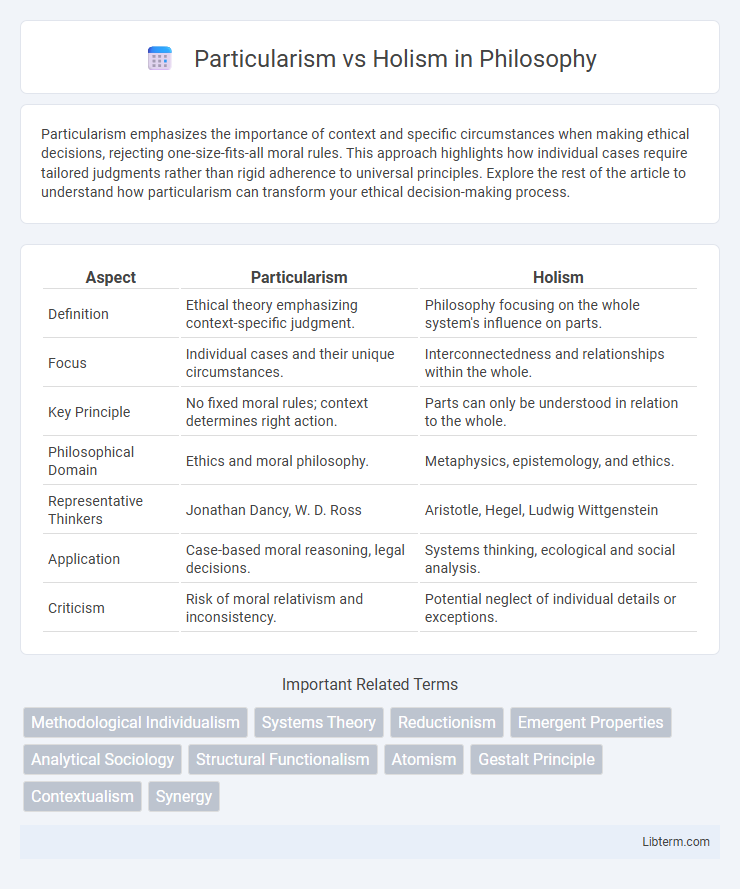Particularism emphasizes the importance of context and specific circumstances when making ethical decisions, rejecting one-size-fits-all moral rules. This approach highlights how individual cases require tailored judgments rather than rigid adherence to universal principles. Explore the rest of the article to understand how particularism can transform your ethical decision-making process.
Table of Comparison
| Aspect | Particularism | Holism |
|---|---|---|
| Definition | Ethical theory emphasizing context-specific judgment. | Philosophy focusing on the whole system's influence on parts. |
| Focus | Individual cases and their unique circumstances. | Interconnectedness and relationships within the whole. |
| Key Principle | No fixed moral rules; context determines right action. | Parts can only be understood in relation to the whole. |
| Philosophical Domain | Ethics and moral philosophy. | Metaphysics, epistemology, and ethics. |
| Representative Thinkers | Jonathan Dancy, W. D. Ross | Aristotle, Hegel, Ludwig Wittgenstein |
| Application | Case-based moral reasoning, legal decisions. | Systems thinking, ecological and social analysis. |
| Criticism | Risk of moral relativism and inconsistency. | Potential neglect of individual details or exceptions. |
Introduction to Particularism and Holism
Particularism emphasizes understanding concepts, events, or objects by examining their specific, distinct features without generalizing beyond individual instances. Holism, in contrast, advocates for analyzing systems, phenomena, or ideas as integrated wholes, where the interaction and relationships between parts are crucial to comprehension. These approaches shape diverse fields such as philosophy, ethics, cognitive science, and anthropology by influencing interpretative frameworks and methodological strategies.
Defining Particularism: Key Characteristics
Particularism emphasizes the importance of context and individual cases over universal principles in ethical decision-making, highlighting the variability of moral judgments based on specific circumstances. It rejects the notion of fixed moral rules, advocating flexibility and attentiveness to relevant details in each situation. This approach contrasts with holistic ethics by prioritizing situational factors, making it essential in fields like law and bioethics where unique case elements dictate outcomes.
Understanding Holism: Core Principles
Holism emphasizes that systems and their properties should be analyzed as wholes, not just through their individual components. Core principles include the interconnectedness of parts, where understanding is derived from the relationships and contexts within the entire system. This approach contrasts with particularism by stressing the significance of overall patterns and systemic unity in explaining phenomena.
Historical Origins and Philosophical Foundations
Particularism and holism emerged from contrasting philosophical traditions addressing the nature of knowledge and reality, with particularism tracing its roots to empiricism and analytic philosophy emphasizing individual facts and examples. Holism, grounded in metaphysical and systemic theories, evolved through the works of thinkers like Hegel and Gestalt psychologists, positing that systems and contexts shape understanding beyond isolated components. Historical debates between rationalists and empiricists further shaped their philosophical foundations, highlighting tensions between focusing on discrete particulars and integrated wholes in epistemology and ethics.
Particularism vs Holism in Ethics
Particularism in ethics emphasizes the importance of context and specific details in moral judgment, arguing that ethical principles cannot be universally applied without considering individual situations. Holism in ethics, however, advocates for understanding moral actions and principles as interconnected parts of a broader, cohesive ethical system that highlights consistency and generalizable rules. The debate between particularism and holism centers on whether moral reasoning should prioritize case-by-case analysis or overarching ethical frameworks.
Impact on Social and Political Thought
Particularism emphasizes the significance of individual contexts and unique circumstances in shaping social and political policies, fostering tailored approaches that address specific group needs. Holism advocates for understanding social and political phenomena as interconnected systems, promoting comprehensive strategies that consider the broader societal impact. The intellectual tension between particularism and holism influences debates on identity politics, governance models, and policy-making, shaping frameworks that balance local diversity with global coherence.
Applications in Science and Methodology
Particularism in science emphasizes analyzing specific components or cases to derive conclusions, often applied in experimental research and case studies to identify causal relationships. Holism advocates for understanding systems as integrated wholes, crucial in fields like ecology, systems biology, and social sciences where interactions and context shape outcomes. Methodologically, particularism often relies on reductionist approaches, while holism employs systemic and interdisciplinary frameworks to capture complexity and emergent properties.
Comparative Analysis: Strengths and Weaknesses
Particularism emphasizes context-specific details, fostering flexibility and adaptability in decision-making but risks inconsistency and subjectivity. Holism advocates for understanding systems and parts as interconnected wholes, promoting coherence and comprehensive insight while potentially overlooking nuanced individual elements. Comparative analysis reveals particularism excels in nuanced moral reasoning, whereas holism provides robust frameworks for integrating complex information across disciplines.
Real-World Examples and Case Studies
Particularism emphasizes analyzing individual cases by focusing on specific details and contexts, as seen in legal judgments where precedent influences decisions uniquely. Holism examines systems as integrated wholes, exemplified by ecological studies that consider interactions between species and environments to understand biodiversity. In healthcare, particularism guides personalized treatment plans, whereas holism supports comprehensive approaches addressing physical, emotional, and social factors.
Conclusion: Bridging Particularism and Holism
Bridging particularism and holism requires integrating context-specific details with broader systemic understanding to enhance decision-making and problem-solving. Emphasizing the interplay between individual elements and the whole system improves accuracy in fields like ethics, cognitive science, and linguistics. This synthesis fosters more comprehensive frameworks that balance specificity with generalization for effective analysis and application.
Particularism Infographic

 libterm.com
libterm.com